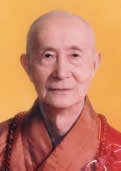 Master Yin Shun was the teacher of Master Jen-Chun, the founder of Bodhi Monastery, and thus, though he never held any official position in Bodhi Monastery’s administration, he was in a sense the “spiritual mentor” of the monastery. It is his vision of the integral unity of the Buddha–Dharma and the themes he has highlighted in the unfolding history of Buddhism that grounds our approach to Buddhist theory and practice.
Master Yin Shun was the teacher of Master Jen-Chun, the founder of Bodhi Monastery, and thus, though he never held any official position in Bodhi Monastery’s administration, he was in a sense the “spiritual mentor” of the monastery. It is his vision of the integral unity of the Buddha–Dharma and the themes he has highlighted in the unfolding history of Buddhism that grounds our approach to Buddhist theory and practice.
During the course of his long life, which stretched across a full century, Master Yin Shun had come to be recognized as the foremost Chinese scholar–monk of the modern age. The author of close to fifty volumes, he almost single–handedly spearheaded an intellectual Renaissance of Buddhism in Taiwan, enabling Chinese Buddhists in Taiwan to take their place among their scholarly peers from other Buddhist countries.
Master Yin Shun was not only a scholar but also a visionary and a reformer. Unlike the academic scholar, his erudition was not motivated by a mere thirst for factual knowledge about Buddhism but by a desire to understand the fundamental truth of the Dharma: to understand Buddhism in its depths and as a whole. This urge for understanding was in turn driven by a conviction that the Buddha’s teaching provided the key to rescue the world from suffering. When he first embraced the Dharma, however, he found the Chinese Buddhism that he encountered singularly unfit to meet this urgent challenge. He thus set out to use his understanding of Buddhist history and philosophy to transform the face of Chinese Buddhism and bring it into accord with the modern age. Though in his early years he faced stiff opposition from a conservative monastic establishment, especially after he migrated to Taiwan, for the past three decades he has been hailed as the most seminal thinker in the Chinese Buddhist world.
Born in 1906 in a rural village not far from Shanghai, he received monastic ordination in 1930. As a young monk, he was struck by the discrepancy between the Buddha Dharma he read about in the sacred texts and the stark actuality of Chinese Buddhism that he could observe around him: a religion mired in superstition, empty rituals, and blind devotion. This gap became the problem which troubled him and which he sought to rectify in his writings. The transformed and purified form of Buddhism that Master Yin Shun advocated, which constituted his special platform, was what he called “Buddhism for the human realm.”
As a Mahayana Buddhist, Master Yin Shun gave precedence to the practice of the bodhisattva path, but he emphasized the continuity of this path with the practices advocated in Early Buddhism. He stressed what he calls the “normal” bodhisattva path, which revolves around the generation of the bodhicitta, the cultivation of great compassion, the practice of the six paramitas, and the clarification of right view based on the wisdom of the middle way. His own great wish, which he often expressed in his writings, was to be reborn in the human world again and again so that he could follow the bodhisattva path as a human being.
Master Yin Shun did not try to build a personality cult around himself, nor did he allow others to turn him into an object of adoration. As a man he was simple, humble, and unassuming, one who always stressed the central importance of the Dharma, not of himself. His life was a true example of the Buddhist teaching of selflessness, which he himself explained with depth and clarity in his writings. It remains a major project for Buddhist scholarship in the West to see that these are translated into English.




